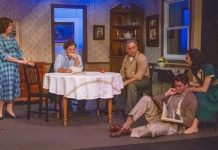
Part one of a two part series
It is amazing how one moment can define everything. How one simple moment, that seems inconsequential at the time, can actually be the forbearer of everything that is about to come. 24th Street Theatre had that moment shortly after moving into their new space. While hanging the grid a young boy walked into the converted carriage house and asked what in the heck they were hanging up all of those lights for. They could have shooed him away, told him to come back when they were open. Instead, they climbed down off their ladders and to their amazement learned that this little boy had no idea what theater was. They didn’t know it at the time, but the way that they approached that boy would be the way that their company would approach everything they were to do in the years that followed. By the time that the little boy left, his eyes had been opened to the amazing world of theater and the 24th Street Theatre had taken its first step toward a new approach to what a theater company can be for its community.
From the outset, 24th Street was built on one fundamental and inscrutable belief – at a certain point doing art for art’s sake is no longer good enough. Art needs to matter. It needs to make a difference. First things first, establish themselves as a professional theater that produces high quality work. Second, build an arts education program to bring theater to students who wouldn’t normally get to experience that wonder. Third, reach out into and become not only an active participant, but a resource for the community in which they had chosen to locate their new home. The work laid out before them was daunting, but they were more than up for the challenge.
Where the professional theater and educational outreach aspects of the company are concerned, the numbers speak for themselves. 24th Street’s productions have been winning awards for years. Their most recent production, “Walking the Tightrope” directed by artistic director Debbie Devine, garnered 17 award nominations, resulting in 7 wins – including Best Production – and is currently on tour across the United States. Even more astounding, “Walking the Tightrope” is a children’s show.
In 2012, 24th Street Theatre announced that they were going TYA, or Theatre for Young Adults. They made this shift not because they love children’s theater, quite the opposite, they hate it. They hate that it is largely simplistic, pandering and coddling to the youth that watch. With few exceptions TYA is filled with bright colors, happy topics and bored parents. “Walking the Tightrope” shatters this mold. It is just as engaging for parents as it is children and elegantly addresses the topic of losing a grandparent. It is complex with layers of imagery and symbolism and absolutely mesmerizing. At the age of six I would have loved it. By the age of eight, after losing my grandfather, I would have found a warm comfort and understanding that wasn’t provided to me anywhere else. As an adult, I was moved by its beauty and grace and had no idea that it was produced as TYA. Like the little boy, my eyes were opened to the kind of quality and depth that can, and should, exist in the TYA world.
When not directing award winning theater, Devine acts as 24th Street Theatre’s education director for both classes held at the theater and Enter Stage Right (ESR), an arts education program started in 2003. ESR started small serving just five schools. However, by the end of the school year they had expanded to 25 schools. The next year they served 35. 2005 saw 50 schools on the schedule, followed by 65 and then 80, until Enter Stage Right had grown into one of the largest Arts Ed programs in the country serving 11,000 students in 110 schools in the LA Metro area. Those numbers dropped significantly when the economy fell and school districts cut their arts funding drastically if not completely. However, through generous sponsors and grants 24th Street has raised over a quarter of a million dollars to underwrite this invaluable program and hopes to bring the number of students they serve back up to the pre-funding-cuts numbers by the end of 2015.
24th Street is so committed to bringing theater into schools that they partnered with Farmers Insurance and the actor Jack Black, a protégé of Devine’s, to put together an interactive video and curriculum that can be used in schools across the country. The program, featuring Black in the video, comes complete with cross-curricular lesson plans using theater to teach math and history as well as language arts. Black and Devine appeared at a press conference in December of 2013 to kick off Farmers Insurance “Thank a Million Teachers” initiative, with Devine being honored as the first teacher thanked.
These numbers speak for themselves. They would be impressive coming out of a large organization, but coming out of small organization that boasts a 99 seat theater and only four full-time staff members, these numbers are astonishing and speak volumes to the caliber, dedication and vision of the people involved. However, it is the enigmatic community involvement aspect of 24th Street Theatre that is perhaps the most intriguing. Unlike their theater and education successes, which are easily quantifiable, their community outreach is more easily felt and seen than quantified.
24th Street Theatre
http://www.24thstreet.org/
1117 W 24th St, Los Angeles, CA 90007
213-745-6515














